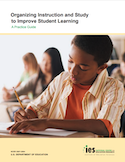Organize Your Teaching
Explore resources designed to improve instruction so that students can better understand, remember and apply what they have learned. 
- View a visual diagram of all four practices
- Watch a topic overview and download planning templates
- Listen to an expert
Explore the subtopics below to learn more about the recommended practices:
To learn more about the research underlying these practices, view the IES Practice Guide, Organizing Instruction and Study to Improve Student Learning.
- Items 1 - 12 of 52
Sort by:
Connecting Abstract and Concrete Representations of Concepts
Organize Your Teaching > Abstract & Concrete > Overview & Tools
View this multimedia overview to learn about how connecting abstract ideas with concrete situations can help students understand difficult concepts and transfer their knowledge to new situations.
Resource Type
Overview
Using Higher-Order Questions to Help Students Build Explanations
Organize Your Teaching > Higher-Order Questions > Overview & Tools
View a multimedia overview to learn how teachers can promote critical thinking skills by posing higher-order questions and encouraging student explanations.
Resource Type
Overview
Spacing Learning Over Time With Review and Quizzing
Organize Your Teaching > Spacing Learning > Overview & Tools
View this multimedia overview to learn about how spacing the review of key concepts over weeks and months and using quizzes can improve students' memory.
Resource Type
Overview
Alternating Worked Examples With Practice
Organize Your Teaching > Examples With Practice > Overview & Tools
This multimedia overview explains how alternating worked examples with opportunities for problem solving improves student learning/
Resource Type
Overview
How to Organize Your Teaching
Organize Your Teaching > Overview & Tools
Research in cognitive psychology suggests several ways teachers can organize instruction to improve their students' learning. Use this multimedia overview to learn about research-based strategies...
Resource Type
Overview
Strategic Study: Using the “Delayed Judgment of Learning” Task
Organize Your Teaching > Spacing Learning > See How It Works
In this interview, professor Janet Metcalfe describes how teachers can teach their students to use flashcards to assess what they know, and what they don't know, and to strategically focus their...
Resource Type
Expert Interview
Key Concepts in Using Higher-Order Questions
Organize Your Teaching > Higher-Order Questions > Learn What Works
Listen as Dr. Annemarie Palincsar discusses the importance of asking higher-order questions and how to build opportunities for deep explanations in the classroom.
Resource Type
Expert Interview
Using Concrete Situations to Introduce Content
Organize Your Teaching > Abstract & Concrete > Learn What Works
In this interview, Dr. Brian Bottge talks about how teachers can introduce content with real-world problem scenarios and make connections with abstract concepts.
Resource Type
Expert Interview
Key Concepts in Spacing Learning Over Time
Organize Your Teaching > Spacing Learning > Learn What Works
Listen to Dr. Mark McDaniel discuss how spacing learning of material over time improves memory, and understand the optimal ways to space course materials.
Resource Type
Expert Interview
Using Quizzes to Boost Achievement
Organize Your Teaching > Spacing Learning > Learn What Works
Listen as Dr. Mark McDaniel describes how short, frequent, ungraded quizzes are useful tools for promoting memory and retention over time.
Resource Type
Expert Interview
Key Concepts in Alternating Worked Examples With Practice
Organize Your Teaching > Examples With Practice > Learn What Works
Listen to Dr. Ken Koedinger talk about how alternating examples with practice improves students' problem-solving strategies.
Resource Type
Expert Interview
Key Concepts in Organizing Instruction and Study
Organize Your Teaching > Overview & Tools
Dr. Hal Pashler, chair of the expert panel that produced the IES Practice Guide on Organizing Instruction and Study to Improve Student Learning, describes how research in cognitive psychology can...
Resource Type
Expert Interview














